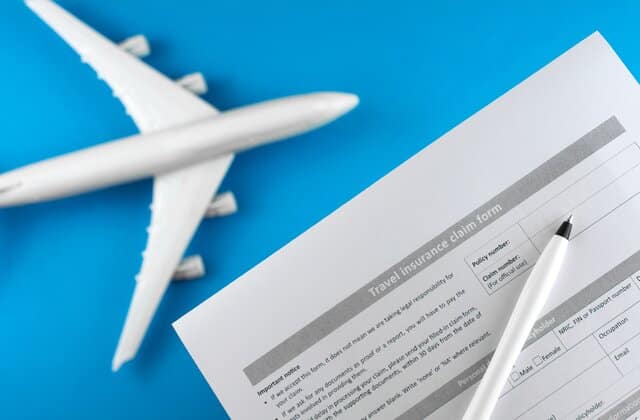Traveling can be an exciting and enriching experience, but it’s not without its uncertainties. To mitigate the financial risks associated with unforeseen events, many travelers consider purchasing trip insurance. The primary purpose of trip insurance is to protect the financial investment made in a trip. Trip insurance can be particularly valuable for cruises as they often involve substantial upfront costs and may have specific cancellation policies. It provides coverage for trip cancellation, interruption, medical emergencies, and other cruise-related risks. This is detailed information about all you need to know if trip insurance is worth taking, particularly for international travel or when regular health insurance coverage is limited.
Is Trip Insurance Worth It?
Deciding whether trip insurance is worth it depends on several factors, including the cost of your trip, your risk tolerance, and the potential risks and uncertainties associated with your travel plans.
Evaluating the Worth of an Insurance Trip:
#1. Trip Cost
Trip insurance can provide financial protection in case of cancellation if a significant amount of money has been invested. It can also be useful in cases of interruption, or other unforeseen events that could cause loss of money.
#2. Cancellation Policy
Trip insurance helps to recover some or all the costs if you need to cancel for a reason or for emergencies. It is best to check the cancellation policy of the travel arrangement.
#3. Travel Destination
Trip Insurance can offer peace of mind by providing coverage from unexpected events. It also helps if the travel destination is to a politically unstable region or accident-prone.
#4. Health Coverage
Trip insurance with medical benefits can be valuable, particularly for international travel where healthcare costs can be significant.
#5. Personal Circumstances
Trip insurance can cover pre-existing health conditions that may occur during the trip and it could be beneficial.
#6. Risk Tolerance
If the potential financial loss would cause significant distress, trip insurance provides peace of mind and mitigates the financial impact.
The decision to purchase trip insurance is a personal one. Assess your circumstances, and the level of risk involved.
Purposes of Trip Insurance
#1. Trip Cancellation
Trip insurance helps reimburse prepaid, non-refundable expenses. That is you need to cancel your trip before departure due to certain reasons, such as illness, injury, or certain emergencies.
#2. Trip Interruption
Trip insurance can help reimburse the unused portion of your trip expenses and additional transportation costs. If you need to cut your trip short or return home early due to covered reasons.
#3. Travel Delay
If your trip is delayed for a specified amount of time, trip insurance can provide coverage for additional expenses incurred, such as accommodations, meals, and transportation.
#4. Baggage Loss or Delay
Trip insurance often covers the loss, theft, or damage of your baggage, including compensation for the value of lost items. It also offers reimbursement for essential purchases if your baggage is delayed for a certain period.
#5. Medical Expenses
Many trip insurance policies include coverage for emergency medical and dental expenses incurred while traveling. This can include hospitalization, doctor visits, prescription medications, and emergency medical evacuation or repatriation.
#6. Emergency Assistance Services
Trip insurance often provides access to 24/7 emergency assistance services that can assist with travel-related emergencies. These include medical referrals, locating local medical facilities, or arranging emergency transportation.
#7. Travel Accident Coverage
Some trip insurance policies offer coverage for accidental death or dismemberment that may occur during your trip.
It offers travelers a safety net and peace of mind, knowing that they are financially protected during their journey.
Different Between Trip Insurance and Travel Insurance
#1. Trip Insurance
Trip insurance typically refers to a type of insurance that provides coverage for specific risks and expenses related to a single trip or vacation. It is focused on protecting the financial investment made in that particular trip. Trip insurance commonly includes coverage for trip cancellation, trip interruption, travel delay, baggage loss, and medical expenses incurred during the trip. It is often purchased for a specific trip duration and may be available as a standalone policy. It can be offered as an add-on when booking flights, hotels, or vacation packages.
#2. Travel Insurance
Travel insurance is a broader term that encompasses a wider range of insurance products designed to cover various aspects of travel. It can include coverage for multiple trips within a specified period, such as annual travel insurance. Travel insurance can provide more comprehensive protection that extends beyond a single trip and can cover a broader scope of risks. It also covers risks such as emergency medical expenses, medical evacuation, personal liability, trip cancellation, baggage loss, and more.
When is Trip Insurance Worth It?
Trip insurance can be worth it based on the following circumstances:
- Expensive Trips: If the trip is expensive, having trip insurance is great to secure a loss incurred due to unforeseen circumstances.
- Non-Refundable Expenses: If your travel arrangements, such as flights, hotels, or tours, have strict cancellation policies or non-refundable fees. Trip insurance can help if you need to cancel because of an emergency.
- Traveling to High-Risk Areas: Trip insurance can offer valuable coverage for trip cancellation, evacuation, or medical expenses resulting from unexpected events.
- Medical Coverage Abroad: Trip insurance with medical benefits can be worthwhile, particularly for international travel where healthcare costs can be significant.
- Adventure or Hazardous Activities: It is best to consider trip insurance that covers potential injuries or emergencies related to those activities. Especially if the trip involves activities such as extreme sports, adventure tourism, or other hazardous pursuits.
- Review the policy terms, conditions, and exclusions of any trip insurance plan you are considering to ensure it aligns with your specific needs and concerns.
Is Trip Insurance Worth it for a Cause?
Trip insurance can be particularly worth considering for a cruise due to some unique factors associated with this type of travel.
Few Reasons why Trip Insurance may be Valuable for a Cruise:
#1. Itinerary Disruptions
Cruises can be impacted by unforeseen events like extreme weather conditions, and mechanical failures. Incidents like these may result in itinerary changes delays, or even trip cancellations. Trip insurance can provide coverage for these types of disruptions. It also includes reimbursement for missed port stops or additional expenses incurred due to changes in the itinerary.
#2. Non-Refundable Cruise Fare
Many cruise lines have strict cancellation policies or penalties for canceling or changing your booking closer to the departure date. Trip insurance can help protect your investment if you need to cancel or interrupt your trip for a covered reason.
#3. Medical Emergencies at Sea
While cruising, access to medical facilities and emergency services may be limited compared to being on land. Trip insurance that includes medical coverage can be crucial in the event of illness or injury during the cruise. It can help cover medical expenses, emergency medical evacuation, or transportation to a medical facility ashore if necessary.
#4. Pre- and Post-Cruise Travel
Trip insurance can provide coverage for these components if you have additional travel arrangements after the cruise. Components such as flight or hotel bookings. This can be helpful if you need to cancel or change these arrangements due to a reason.
#5. Cruise-specific Coverage
Some trip insurance policies offer cruise-specific benefits, such as coverage for missed port departures, and cabin confinement due to illness. Some offer reimbursement for pre-paid shore excursions that you are unable to attend due to certain reasons.
Here are a few factors to consider whether to buy travel insurance for your flight:
#1. Coverage Options
Buying travel insurance directly from the airline often provides limited coverage options. It’s beneficial to explore various insurance providers to find a policy that offers the specific coverage you need, such as trip cancellation, medical expenses, or baggage loss.
#2. Cost Comparison
Travel insurance bought from airlines may be more expensive compared to others offered by insurance companies or travel insurance providers. It’s worth comparing prices and coverage limits to ensure you are getting the best value for your money.
#3. Policy Terms and Conditions
The terms and conditions of travel insurance vary among providers. Buying insurance separately allows you to review and compare the policy details. It also includes coverage limits, exclusions, and claims processes, to choose the one that best suits your needs.
#4. Flexibility and Customization
Standalone travel insurance policies often provide more flexibility in customizing your coverage to match your specific travel plans and circumstances. You can tailor the policy to include additional coverage for high-value items, adventure activities, or pre-existing medical conditions, based on your requirements.
#5. Comprehensive Coverage
While some airline-offered insurance may provide basic coverage, standalone policies often offer more comprehensive coverage options. It’s important to carefully evaluate what is covered and what is excluded to ensure your policy meets your specific needs.
#6. Customer Service and Support
When purchasing travel insurance separately, you have the opportunity to research the reputation and customer service of different insurance providers. This can be valuable when it comes to filing claims or seeking assistance during your trip.
Is Trip Insurance Worth it for Flights?
Trip insurance can be worth it, especially considering flights, especially in certain situations.
Factors to Consider when Deciding if Trip Insurance is Worth it for Flights.
#1. Baggage Loss or Delay
Trip insurance may offer coverage for lost, stolen, or delayed baggage. If you are carrying valuable or essential items in your checked or carry-on luggage. Having insurance protection can help cover the cost of replacing those items.
#2. Non-Refundable Tickets
Trip insurance protects you in case you need to cancel or change your flight due to certain reasons. It can help you recoup the cost of the non-refundable ticket or any change fees imposed by the airline.
#3. Expensive International Flights
If you have invested a significant amount of money in international flights, trip insurance can be valuable. It can provide coverage for trip cancellation, trip interruption, or trip delay due to covered reasons, offering financial protection for your investment.
#4. Connecting Flights or Complex Itineraries
Trip insurance can provide coverage for additional expenses incurred due to missed flights or delays. It can also assist in rebooking flights or finding alternative travel arrangements.
#5. Medical Emergencies
Medical coverage provided by trip insurance can help cover medical expenses and emergency medical evacuation. Trip insurance can cover transportation back home in case of a serious illness or injury.
#6. Travel Delays and Cancellations
Trip insurance provides coverage for additional expenses incurred due to travel delays, such as accommodation, meals, and transportation.
#7. Traveling during Peak Seasons or Unstable Weather
Flying during peak travel seasons or to destinations prone to extreme weather conditions, there is an increase in flight disruptions. Trip insurance can provide coverage for delays, cancellations, or trip interruptions caused by these factors.
What is the Purpose of Trip Insurance
The purpose of trip insurance is to provide financial protection and peace of mind for travelers in case of unexpected events. It also protects users against other circumstances that could disrupt or impact their travel plans. Trip insurance typically offers coverage for a range of potential risks and expenses associated with travel.
Is it Worth it to get Travel Health Insurance?
Yes, it is often worth getting travel health insurance, especially when traveling internationally. It is also best for destinations where your regular health insurance may not provide adequate coverage.
Some reasons why travel health insurance is worth considering:
- Medical Expenses
- Limited Coverage Abroad
- Emergency Medical Evacuation
- Pre-Existing Conditions
- Peace of Mind
- Destination-Specific Risks
Is it Best to Buy Travel Insurance with your Flight?
While it is convenient to buy travel insurance when purchasing your flight, it is not always the best option. It is generally recommended to research and compare travel insurance options from multiple providers to ensure you get the most suitable coverage at the best price.
What is the Difference Between Trip Insurance and Travel Insurance?
The terms “trip insurance” and “travel insurance” are often used interchangeably, and their meanings can vary depending on the context.
Trip Insurance focuses on protecting the financial investment made in that particular trip. Travel Insurance on the other hand is a broader term that focuses on various aspects of travel. it covers multiple trips within a specified period. Travel insurance is suitable for frequent travelers or those who want coverage for multiple trips throughout the year.
What are the Benefits of Trip Protection?
Trip protection, also known as trip cancellation/interruption insurance, offers several benefits that can help protect your investment.
Key benefits of trip protection:
- Trip Cancellation Coverage
- Trip Interruption Coverage
- Travel Delay Coverage
- Baggage Loss or Delay Coverage
- Medical Expense Coverage
- 24/7 Assistance Services
How Does Trip Protection Work?
Trip protection refers to a type of travel insurance product that can help protect against financial losses and risks that may arise before or during a trip. Trip protection can provide benefits such as trip cancellation coverage, trip interruption coverage, medical expense coverage, baggage loss or delay coverage, and travel assistance services. The exact coverage and benefits of trip protection can vary depending on the insurance plan or provider.
To use trip protection, you would typically need to purchase a policy before your trip and then file a claim if you experience a covered loss or issue during your trip that causes financial hardship.
What is the Most Important Thing in Travel Insurance?
Determining the most important aspect of travel insurance can depend on your circumstances and priorities.
Three key aspects in consideration
- Medical Coverage
- Trip Cancellation and Interruption Coverage
- Emergency Assistance Services
Does Everyone Need Travel Insurance?
The need for travel insurance depends on various factors, including your circumstances, the nature of your trip, and the level of risk you are willing to assume.
While travel insurance is not mandatory for all travelers, it is generally recommended for the following situations:
- International Travel
- Cost of the Trip
- Medical Conditions or Age
- Adventure or High-Risk Activities
- Traveling with Expensive or Valuable Belongings
- Traveling to Areas with Political Unrest or Natural Disasters
- Travel insurance is not a one-size-fits-all solution, and the level of coverage needed can vary.
Conclusion
Buying travel insurance with your flight can be convenient, but it’s not the only option. It’s advisable to compare different insurance providers and policies to find the one that offers the best coverage and suits your needs. Trip protection offers benefits such as reimbursement for trip expenses in case of cancellation or interruption, coverage for travel delays and baggage loss, limited coverage for emergency medical expenses, and access to 24/7 emergency assistance services. Trip insurance and travel insurance are often used interchangeably and refer to the same type of coverage. Both provide protection against trip-related risks such as trip cancellation, interruption, and medical emergencies.
Related Articles
- BEST WAY TO RENT A CAR: Best 2023 Practices & All You Need
- How to Plan a Business Trip for Your Team: Research Your Destination, Rent a Charter Bus, and More
- How To Cancel Your Car Insurance Policy: Step-By-Step Guide
- UNITED AIRLINES LOGO: Meaning, History, and Why the Logo Was Changed
- BEST TRAVEL APP FOR FLIGHTS: Best App for Flights, Hotels & What You Should Know






